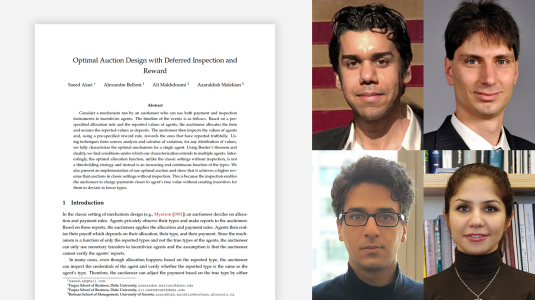-
Effective attribution of causes to outcomes is crucial for optimizing complex supply chain operations. Traditional methods, often relying on waterfall logic or correlational analysis, frequently fall short in identifying the true drivers of performance issues. This paper proposes a comprehensive framework leveraging data-driven causal discovery to construct and validate Structural Causal Models (SCMs).
-
AI and Deep Learning methods have revolutionized many forecasting applications but have not achieved widespread adoption in industry for aggregate forecasting. This paper challenges the AI research community by identifying three critical capabilities that current AI approaches lack: (1) multivariate consistency at scale, (2) explainable and controllable longrun assumptions, and (3) flexible incorporation
-
International Journal of Research in Marketing2025In 2020, Amazon launched the Climate Pledge Friendly (CPF) program to make it easy for customers to discover and shop for products with sustainability certifications. In this paper, we measure the causal impact of products qualifying for CPF on consumer purchase behavior. Using a dataset of about 45,000 products spanning three categories, and a Differencein-Differences identification strategy, we show that
-
AAAI 2025 Workshop on AI for Social Impact2025To the best of our knowledge, this work introduces the first framework for clustering longitudinal data by leveraging time-dependent causal representation learning. Clustering longitudinal data has gained significant attention across various fields, yet traditional methods often overlook the causal structures underlying observed patterns. Understanding how covariates influence outcomes is critical for policymakers
-
2023 Conference on Digital Experimentation @ MIT (CODE@MIT), NeurIPS 20242024This paper introduces the confounded pure exploration transductive linear bandit (CPET-LB) problem. As a motivating example, often online services cannot directly assign users to specific control or treatment experiences either for business or practical reasons. In these settings, naively comparing treatment and control groups that may result from self-selection can lead to biased estimates of underlying
Related content
-
June 23, 2022Two-day RecSys workshop that extends the popular REVEAL to include CONSEQUENCES features Amazon organizers, speakers.
-
May 16, 2022Matt Taddy, vice president of Amazon’s Private Brands business, is the coauthor of Modern Business Analytics: Practical Data Science for Decision Making, a primer for those who want to gain the skills to use data science to help make decisions in business and beyond.
-
March 22, 2022Amazon Scholar Alexandre Belloni discusses the implications of auction design on digital goods.
-
January 7, 2022Amazon Scholar David Card and Amazon academic research consultant Guido Imbens talk about the past and future of empirical economics.
-
December 13, 2021Amazon Research Award recipient Éva Tardos studies complex theoretical questions that have far-ranging practical consequences.
-
November 17, 2021The paper by Özer and his co-authors examines the role of earmarking and transparency on donors and their donations.







